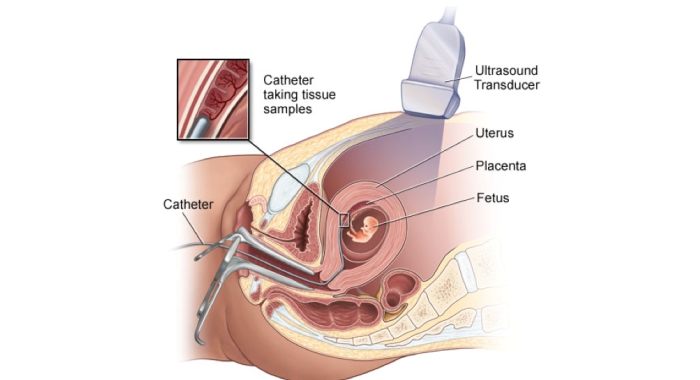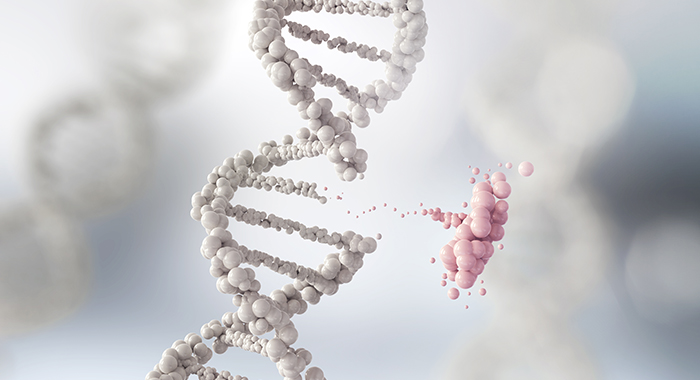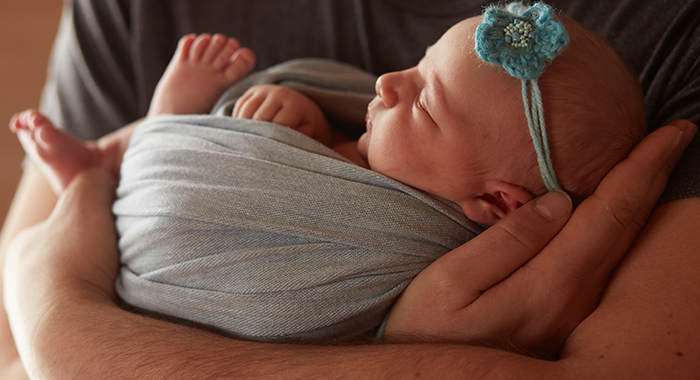Chorionic Villus Sampling (CVS)
Chorionic Villus Sampling (CVS)

Chorionic Villus Sampling (CVS)
Advanced Prenatal Genetic Diagnosis for Early Peace of Mind
Empowering parents with essential genetic insights through safe and precise testing.
Chorionic Villus Sampling (CVS) is an advanced prenatal diagnostic procedure designed to detect genetic and chromosomal abnormalities in a developing foetus. By carefully sampling placental tissue, our experts can accurately identify potential genetic disorders, providing crucial early insights to expecting parents.
At Sikund Diagnostic Centre, our dedicated specialists combine state-of-the-art technology with compassionate care, helping parents make informed decisions about their pregnancy with confidence.
When is CVS Recommended?
Your healthcare provider may recommend Chorionic Villus Sampling if:
- Prenatal screening indicates a higher risk of genetic conditions.
- You or your partner has a family history of genetic disorders.
- You have previously had a pregnancy or child affected by a genetic or chromosomal condition.
- Advanced maternal age (typically over 35) is associated with an increased risk of chromosomal abnormalities.
The ideal period for performing amniocentesis is between 17 to 22 weeks of pregnancy, with the optimal timing being around 18-19 weeks for maximum accuracy.

Conditions Detected by CVS
Our advanced genetic testing analyses placental tissue to identify:
- Chromosomal Abnormalities: Such as Down syndrome (Trisomy 21), Edward syndrome (Trisomy 18), and other significant chromosomal issues.
- Genetic Disorders: Detection of conditions such as cystic fibrosis, sickle cell anaemia, thalassaemia, and Tay-Sachs disease.
What to Expect During the Procedure
At Sikund Diagnostic Centre, the CVS procedure is performed with precision, safety, and comfort, ensuring the best care and minimal discomfort.
- Detailed Consultation and Counselling
Our specialists provide comprehensive information on CVS, explaining the benefits, risks, and answering all your questions thoroughly. - Ultrasound-Guided Sampling
Using ultrasound guidance, a thin catheter or needle is carefully inserted through the abdomen or cervix to collect a small sample of placental tissue. The procedure is typically brief and minimally uncomfortable. - Advanced Laboratory Analysis
The collected sample undergoes precise genetic testing, including:- QFPCR: Quick preliminary testing for common genetic abnormalities.
- Karyotyping: Comprehensive chromosome analysis.
- Microarray: Detailed genetic analysis for subtle variations and abnormalities.
- QFPCR: Quick preliminary testing for common genetic abnormalities.
- Prompt Reporting of Results
Results are reported promptly within reliable timelines:- QFPCR: Results within 2-3 days.
- Karyotyping: Results within 15-20 days.
- Microarray: Results within 15-20 days.
- QFPCR: Results within 2-3 days.
- Expert Counselling and Follow-Up
Once results are ready, our genetic counselling experts clearly explain the findings, provide emotional support, and assist in making informed decisions regarding the pregnancy and further care.
Patient Preparation and Aftercare
- Preparation: No special preparation is generally required. It is advisable to have a full bladder if the procedure is done transabdominally.
- Post-Procedure Care: Rest is recommended immediately after the procedure. Avoid strenuous activities for the next 24-48 hours. Typically, you can resume normal activities after a day unless advised otherwise by your physician.
Benefits vs Risks: Your Safety is Our Priority
CVS is considered safe when performed by experienced specialists. While minimal, potential risks include minor discomfort, spotting, or a very rare risk of infection or miscarriage. At Sikund Diagnostic Centre, we significantly reduce these risks through ultrasound guidance, sterile techniques, and careful monitoring.
Your comfort, safety, and informed decision-making are at the heart of our services.

Frequently Asked Questions
Is the CVS procedure painful?
CVS typically involves minimal discomfort. Patients might experience mild cramping during the procedure, which usually subsides shortly afterwards.
How long does CVS take?
The CVS procedure itself usually takes about 20-30 minutes, including preparation, ultrasound guidance, and tissue sampling.
Is CVS safe for my baby?
The risks associated with CVS are very low, especially when performed by skilled specialists under ultrasound guidance.
How accurate is CVS testing?
CVS is highly accurate (approximately 99%) for diagnosing genetic and chromosomal abnormalities, allowing for confident decision-making early in pregnancy.
Need Expert Advice?
Request a Call Back
Today!
We’ll make a single attempt to contact you from a withheld number, typically within 24 hours of your request.
